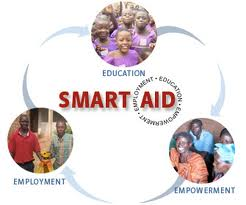In my research on sustainable development programs, I have always been interested in organizations that focus on efficient and effective aid strategies in their work. I was particularly impressed with The ONE Campaign’s clever acronym explaining what  “SMART” Aid means to them:
“SMART” Aid means to them:
S – Sufficient in scale to achieve its intended goals.
M -Measurable so taxpayers and recipients can see results and monitor progress over time.
A – Accountable to the citizens of developing nations.
R – Responsive to the specific needs of the citizens for whom it is intended.
T – Transparent, to allow scrutiny by civil society and the media
In addition to their “SMART” Aid outline, ONE has listed a series of success stories on how effective aid has made significant differences in developing countries, such as halving Malaria deaths in Ethiopia, providing affordable health insurance in Rwanda, and increasing food production in Malawi. The Success Story that I found to be the most impressive was the Acumen Fund’s support of A to Z Textile Mills in Tanzania, a local factory that produces insecticide-treated Malaria nets for the local population. The factory employs more than 4,600 Tanzanians, mostly women, giving them the means to support their families while ensuring the locals are provided with the life-saving nets. Non-Governmental Organizations (NGOs) such as UNICEF and Population Services International (PSI) purchase the nets from A to Z Textile Mills to distribute to those who cannot afford to buy them, both ensuring employment of the more than 4,600 employees, and protecting the local population from Malaria.
I applaud organizations like these who believe that just doing “good” is not enough. I joined their campus chapter at my university last year, and continue to be an active and passionate member because of the great work that they do!


